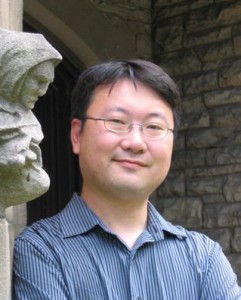 Canadian writer Tony Pi holds a doctorate in linguistics and works in administration at the Cinema Studies Institute, University of Toronto. His short stories have appeared or will appear in diverse venues such as Orson Scott Card’s Intergalactic Medicine Show, Ages of Wonder (DAW), The Best of Abyss & Apex, Volume 1 (Hadley Rille), and On Spec. He was a winner in the Writers of the Future Contest, and his novelette “Metamorphoses in Amber” was a 2008 Prix Aurora Award finalist in the category of “Best Short-Form Work in English”.
Canadian writer Tony Pi holds a doctorate in linguistics and works in administration at the Cinema Studies Institute, University of Toronto. His short stories have appeared or will appear in diverse venues such as Orson Scott Card’s Intergalactic Medicine Show, Ages of Wonder (DAW), The Best of Abyss & Apex, Volume 1 (Hadley Rille), and On Spec. He was a winner in the Writers of the Future Contest, and his novelette “Metamorphoses in Amber” was a 2008 Prix Aurora Award finalist in the category of “Best Short-Form Work in English”.
So what did you do when you were notified about the nomination?
I received the news on Pi Day, which my partner and I were celebrating anyway (just because). We had gone out for dim sum and a walk that morning, and when we came home I checked my email. I almost missed the email because the subject line started with “Congratulations…”, which I generally assume to be spam. But after I read the rest of it, there was a lot of jumping up and down, and explaining to my partner why. We rounded out the day with pizza and apple pie, and the Canadian premiere of the latest Doctor Who Christmas special. All in all, my best Pi Day ever.
How long have you been writing?
About thirteen years ago, when I was working towards my PhD in Linguistics in Montreal, a friend invited me to write stories set in a shared-world superhero milieu for a Usenet newsgroup. Back then, I hadn’t thought seriously about writing professionally, since I wrestling with my thesis in semantics. But being a huge fan of the Wild Cards series, I couldn’t turn down the offer. So, in my spare time, I started writing purely for the love of the superhero trope. I wrote a title called Conclave of Super-Villains, with 40 issues and collaborations over the years where I experimented with different voices and forms, and had a blast doing it.
Later, when I was sharing an apartment with an aspiring writer, he read my online fiction and pushed me to try paying markets and different tropes. I have them to thank for nudging me in the right direction.
Is there a definable point when you realized that writing had changed from a hobby to an avocation?
I think the turning point was when I first met authors working in F&SF. In 2001, I took a writing workshop with Robert J. Sawyer, and was also introduced to Elizabeth Bear outside of a writing context. I took to heart their candid accounts of breaking into the field and staying the course, and resolved to follow their example. I started getting acceptances at semi-pro magazines like On Spec and Abyss & Apex, before winning Second Place in the Writers of the Future Contest.
In what ways does your background in Linguistics influence your fiction?
Linguistics has figured prominently in a couple of stories, like phonetics in “The Stone Cipher” (Writers of the Future, Vol. 23) and forensic linguistics in “Come-From-Aways” (appearing soon in On Spec #76). Having studied linguistics for so long, I’m always happy when I have an idea where language is central. Part of the fun is showcasing the versatility of the discipline.
Do you ever think about writing screenplays?
Only briefly. Although I work as an administrator at the Cinema Studies Institute (which we affectionately call CSI), I don’t think screenplays are my forte. I have experimented with different forms of creative writing, reading voraciously about writing fiction, screenplays, plays, comics and different genres. I decided in the end that I prefer writing prose fantasy, science fiction, and mystery. However, I have several stories where the cinema plays a large role.
What projects are you working on now?
I’m revising a novel manuscript about the shapeshifters who first appeared in “Metamorphoses in Amber.” I’d also like to continue a series of short stories set during the silent film era of an alternate, magical Earth. Beyond those, a couple of anthology invites and a growing list of ideas are waiting their turn for research, characters or plot.
What are you currently reading?
I have a few books currently on the go. My monthly book club will be reading The Hollow Chocolate Bunnies of the Apocalypse by Robert Rankin for April, and I’ve just started The Name of the Wind by Patrick Rothfuss, which I’m enjoying a lot. I was also testing the eReader on my iPod Touch and got totally absorbed in Tarzan of the Apes, so I’ve been reading that over lunch. Finally, I’m tearing through Home from the Vinyl Cafe, a collection of hilarious short
stories by Stuart McLean which he originally read on his CBC radio program. There’s a natural conversational flow to his stories that I admire.
What is it about speculative fiction, in general, that most appeals to you?
Speculative fiction can take you to surprising places and times, introduce you to people who never lived, and teach you the impossible things they can do. As a reader, I love it when I come across an author who’s done solid and clever worldbuilding, or a speculative idea that casts a philosophical issue or ethical dilemma in a new, intriguing way. When I write F&SF, I enjoy coming up with unique settings or wild situations that couldn’t happen in the real world.
